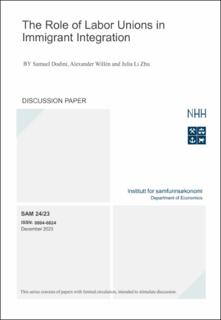| dc.contributor.author | Dodini, Samuel | |
| dc.contributor.author | Willén, Alexander | |
| dc.contributor.author | Zhu, Julia Li | |
| dc.date.accessioned | 2024-01-03T10:07:46Z | |
| dc.date.available | 2024-01-03T10:07:46Z | |
| dc.date.issued | 2023-12 | |
| dc.identifier.issn | 0804-6824 | |
| dc.identifier.uri | https://hdl.handle.net/11250/3109494 | |
| dc.description.abstract | We examine if unions narrow or widen labor market gaps between natives and immigrants. We do so by combining rich Norwegian employer-employee matched register data with exogenous variation in union membership obtained through national government policies that differentially shifted the cost to workers to join a union. While union membership significantly improves the wages of natives, its positive effects diminish substantially for Western immigrants and disappear almost entirely for non-Western immigrants. The effect of unions on native wages, and the role of unions in augmenting the native-immigrant wage gap, is nonexistent in competitive labor markets while it is substantial in markets characterized by a high degree of labor concentration. This implies that unions act as a countervailing force to employer power in imperfect markets and can ameliorate the negative labor market effects of labor market concentration, but only for natives. Using unions as a means to empower workers and solve market failures caused by imperfect competition in the labor market, therefore, is likely to lead to a significant increase in societal inequality. | en_US |
| dc.language.iso | eng | en_US |
| dc.publisher | Institutt for samfunnsøkonomi | en_US |
| dc.relation.ispartofseries | DP SAM;24/2023 | |
| dc.subject | Unions | en_US |
| dc.subject | Migration | en_US |
| dc.subject | Inequality | en_US |
| dc.title | The Role of Labor Unions in Immigrant Integration | en_US |
| dc.type | Working paper | en_US |
| dc.subject.nsi | Samfunnsvitenskap | en_US |
| dc.source.pagenumber | 61 | en_US |
| dc.relation.project | Norges Forskningsråd: 262675 | en_US |
